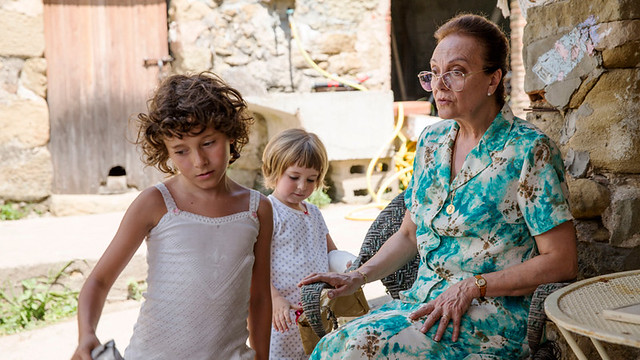
Catalan director Carla Simón's first feature, Summer 1993, is a touching autobiographical film about the AIDS crisis in the 90s seen through a child's eye.
Subtly drawn and quietly devastating, Simón creates a delicate children's film that is not really a children's film, but a memoir of that specific decade in a country that was and is still very religious. It also benefits from stunning lead performance by young Laia Artigas, who plays a 6-year old city girl, Frida, who lost her mother to the epidemic but too young to understand the social stigma it carries.
It starts with Frida leaving her Barcelona home where she lived with her extended family. She is to live with her uncle Esteve and his wife Marga and their 3-year old daughter, Anna, in an idyllic country home. The apartment in the city will be rented out. The sun-drenched countryside is a big change for Frida. But her new family - new mom and dad are loving and understanding, plus she now has a new playmate, Anna.
But she doesn't understand why she is being subject to series of tests in the hospital and other parents freaking out and grabbing their kids around her in the playground when she scrapes her knee and bleeds, and why Marga wears rubber gloves tending her wounds.
Spoiled rotten in her life in the city, sullen Frida is very hard to please. She acts out in ways she doesn't quite understand herself. Good-natured Esteve and Marga do their best, but it seems pretty obvious that the spoiled city girl is a bad influence on Anna. Tired of having a problem child in their household, they argue.
Taught by her grandma, Frida say prayers daily for her mom and leaves things (that she stole from Marga's closet) at an altar of Virgin Mary near the house. Constant visit from her unconditionally loving grandparents and other relatives doesn't help Esteve and Marga's situation, as they spoil the girl to no end and she throws tantrum every time they visit. To make things worse, Frida leaves Anna in the forest and lies to Marga her whereabouts. It is a harmless child’s play, but Anna ends up with a cast on her arms.
After clean bill of health declared by the doctor, Marga lets her guard down a bit, and young Frida soon eases into the country living calling Esteve and Marga mom and dad. But sometimes she falls into fits of melancholy.
The word AIDS or HIV is never uttered in the film. Grown ups in the film obviously have some understanding of what's going on and they speak in hushed tones in front of oblivious Frida. She is a child indelibly marked by tragedy, a product of a specific decade that was marred forever by devastating disease that swept the world.
Handheld, sun-drenched photography provides intimacy and warmth and contrasts our moody heroine and subject matter. It's an incredibly difficult role to play for a child and bright eyed, wild haired Artigas is a revelation. Carefully put together and wonderfully acted, Summer 1993 is a beautiful film not only to reflect on the fearful period of 90s and the generation it affected but also highlights unconditional love of the tight-knit family overcoming tragedy.
SUMMER 1993 opens in New York and Los Angeles on Friday, May 25, with a national rollout to follow. Please visit Oscilloscope Laboratory for mor information.
Dustin Chang is a freelance writer. His musings and opinions on all things cinema and beyond can be found at www.dustinchang.com
No comments:
Post a Comment